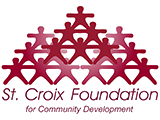Because of the scope of the St. Croix Foundation’s work and the diverse partnerships we’ve built over the last 24 years, each year we gain greater clarity about how to effectively address our community’s needs. We sit on public safety committees and listen to the challenges and new initiatives to tackle them. We listen to our sister nonprofits discuss the social ills plaguing our Territory and the strategies they are employing to heal them, and we work closely with many public sector agencies seeking to support their efforts. What we have learned is that everyone is working tirelessly to institute reforms that will put our children and Territory on the path to prosperity. Yet despite our collective efforts and investments of time and money, we are still talking about the same problems after 20 or more years of trying.
In light of this, 10 years ago, our Board of Directors concluded that almost all roads surrounding our most pressing socio-economic problems lead back to education. Since then, we have invested over a million dollars and volunteered thousands of hours in service to our public schools, educators, and students. We have seen the inner workings of our system, interfacing with key policymakers and leadership teams from the very top of our educational system to working in the trenches with teachers and students.
Today, when we look at our community, we believe that we are in the midst of an urgent, unprecedented economic and social crisis. And the state of our children is particularly catastrophic. For years, the Foundation described the Territory’s children in terms of their academic failings. Now, we believe the situation is much graver. Our children are drowning. Even more chilling than that, our children are dying. In the USVI, in 2010, the death rate of children ages 15 to 19 was 145 per 100,000 teens, the highest level in a decade and three times that of the national rate.
While we recognize this is the result of a myriad of social failures, as a society we have all failed to act. We have failed to meet an urgent crisis with an urgent response. We have failed our children because, as we look out at them drowning, the life rafts we keep throwing at them are simply too small, too few, too tattered, and too outdated. We have spent years building strategic plans and engaging in discussions and debates about the problems and possible solutions, but we have simply not behaved like guardians witnessing their wards crying out for help.
As we stand in the middle of a raging storm, how can we be cautious and tentative in the strategies we employ to save our children? Here we are, in 2014, still weighing the viability of education reform strategies that have proven successful. And all the while, countries around the world that lagged behind the U.S. in every indicator are outpacing old frontrunners. And they’re doing so by being audacious in their response.
The Foundation believes that the real issue before all of us is not whether one strategy is more radical or risky than the other, but rather how do we begin releasing outdated strategies that no longer serve us or our children and begin embracing innovation and change. This should be an exciting moment in the history of these islands. The possibilities are endless. The roads have been cut and paved for us, and there are now detailed roadmaps to help us chart our course.
As a community-based organization, we challenge ourselves to be courageous and resolute in our mission to serve and advocate for those things we believe will empower the least of us for the benefit of all of us. We do this at the risk of being unpopular or standing alone at times because we fundamentally believe that it is our civic obligation. Over the past 18 weeks, we have published editorials and advertisements to raise awareness on the importance of public education to our economy and social wellbeing; to provide information on a variety of reform models; to galvanize education stakeholders and policymakers to learn the system, analyze it, and reform it where necessary, and to encourage voters to demand that their candidates do so.
This November 4th is about finding the pathway to the progress we all need and desire. The chance to make rapid, deep inroads in our educational system and other social systems is profound. But the first step starts with real leadership. This November 4th we must select leaders with the vision and the courage to nurture greater tolerance within our community for sweeping, revolutionary reforms in the Territory. As we enter the voting booth, let us all be fierce, tireless advocates for our children’s success and social welfare! And when the election is over, let’s demand that it remains so. In reality, our children need every one of us. And we need them.
